
Travis Childers, left, and Greg Davis, right, are seeking the U.S. House seat in the 1st Congressional District in Mississippi.
Travis Childers and Greg Davis have been through this before—five months ago, to be precise. When first congressional district representative Roger Wicker was appointed to the U.S. Senate to fill retiring Senator Trent Lott's vacant seat, Childers and Davis ran heated special election campaigns to fill the void. In a wide-open, six candidate primary race, Childers fell 400 votes shy of the "50-plus-one" majority needed to clinch the position, so he and Davis went head to head in a runoff. Childers won with 54%, wresting the congressional seat away from Republican hands for the first time since 1994. But the victory was temporary; the seat is up for election in November, and now the two candidates have to do it all over again.
Mississippi's first is about as red as any state's district can get: the Democratic candidate calls himself "an independent" and the Republican candidate accuses him of being a liberal. The L-word is bad business in northeastern district, which includes Oxford, Tupelo, Columbus and Southaven—where Davis currently serves as Mayor. "You've got to keep in mind, in the last election, our district gave Bush almost 70%," says Davis. "My home county gave almost 86%." President Bush won the district by 25 percentage points in 2004.
The fact that such a staunchly Republican district could hand over a congressional seat to a Democrat has left both parties stunned. Childers' press secretary Dana Edelstein says the changeover occurred because Mississippians, even the conservative ones, are unhappy with the Bush administration and wanted to try something new. The Davis campaign said it was because Childers—who was Prentiss County Chancery Clerk before joining the House of Representatives—didn't have a voting record and could pretend to be more conservative than he really was, all the while painting Davis as a Bush loyalist. "From what he says, he's almost a Republican, isn't he?" joked Davis.
Maybe so, but that may be a problem for Davis, who is trying to wage a campaign against someone who can play the conservative card just as well as he can. The Davis campaign has released attack ads tying Childers to Barack Obama, Nancy Pelosi and John Kerry. But after his winning campaign earlier this year, Childers now has a strong reputation as a pro-life, pro-gun politician. Only a few months into office, Childers sponsored a bill, backed by the National Rifle Association, that would restrict the District of Columbia's ability to regulate firearms. Based on last June's U.S. Supreme Court decision that deemed the city's decades-old handgun ban unconstitutional, the bill also repealed a ban on semiautomatic weapons, prohibited registration requirements for many guns, and dropped criminal penalties for possessing an unregistered firearm. It passed easily in the House, but has not been voted on in the Senate.
Childers voted against the federal government's $700 billion bailout plan, and Davis said he would have voted the same way. But the candidates do differ over the government takeover of Fannie Mae and Freddie Mac, which Childers approved of. Davis said that Fannie and Freddie were just another economic bailout in disguise, and that he would have voted against giving Treasury the authority to take them over. He says he would rather take "a Dave Ramsey approach," referring to the financial writer and media personality who believes that cutting the capital gains tax and insuring mortgages will solve the current financial crisis better than the $700 billion bail-out will. "To be honest with you, if I had spare change I would have been the first in line to buy something," said Davis, regarding the current stock market's woes. "The American economy will survive and it will bounce back again."
Childers has portrayed Davis as a politician who blindly follows his own party and is unwilling to work with Democrats. "Travis is willing to reach across party lines, I'm not sure Davis is going to do that," says Edelstein. Childers has also focused on Davis's record of raising taxes during his time in the Mississippi House of Representatives.
Even in a Democratic-controlled congress, many seats, like Mississippi's first, have been traditionally considered unattainable for Democrats. But if Childers can hold his spot, virtually no GOP-friendly district can be considered out of reach.